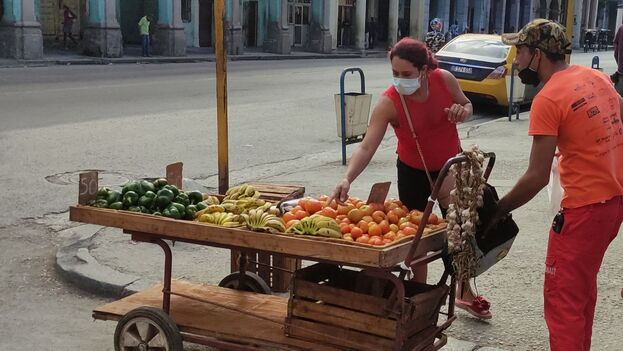
![]() 14ymedio, Havana, 27 October 2022 — Produce market vendors in the Havana suburb of Playa received fines of up to 8,000 pesos and had their merchandise confiscated last weekend by the Municipal Inspection Directorate (DIM) for selling fruits and vegetables at inflated prices.
14ymedio, Havana, 27 October 2022 — Produce market vendors in the Havana suburb of Playa received fines of up to 8,000 pesos and had their merchandise confiscated last weekend by the Municipal Inspection Directorate (DIM) for selling fruits and vegetables at inflated prices.
A local newspaper reported that the DIM imposed penalties on six individuals. The heaviest fines were levied on two people, who were selling tomatoes, peppers and carrots at 300 pesos a pound, lemons for 200 pesos a pound, and pineapples for 100 pesos a pound.
Inspectors fined two vendors 5,000 pesos for not publicly displaying their prices. Another merchant was fined 1,500 pesos for not being able to provide an invoice for the nearly 1,000 plastic bags he had in stock. He was also forced to surrrender the bags to inspectors.
Lastly, another merchant was fined 4,000 pesos for the unauthorized possession and sale of twenty-five crates.
Tribuna de la Habana reported these actions on the eve of an October 25 meeting of the Temporary Work Group (GTT). At the meeting, officials agreed to intensify the government’s crackdown on the illegal sale of food products, hoarding, theft of goods from public institutions and price gouging.
Officials attending the GTT meeting indicated that ongoing investigations have identified sources supplying vendors at Feria 100 y Boyeros, a market named for the intersection of two Havana streets where it is located. On Thursday, inspectors seized more than 400 cartons of eggs there as well as packages of chicken and ground meat for sale at inflated prices.
The official State newspaper Granma reported that, at a meeting on Wednesday, the Council of Ministers discussed “crucial issues regarding the development of Cuba.” Cuban television reported that Prime Minister Manuel Marrero sought the council’s approval for “general directives to prevent and confront crime, corruption, illegality and misconduct, including combating price gouging and the resale of essential goods.”
Last week the government set up fifteen local groups to “confront illegal activities and misconduct” in Havana. Their mission is to identify sources of stolen goods and the makeshift warehouses where they are stored before being sold on the black market.
Despite harsher regulations and tougher fines, the streets are still full of vendors “clandestinely” selling products in broad daylight that are no longer available at state stores.
Vendors at Feria and another market, La Cuevita — places which sell hard-to-find items such as hardware, plumbing supplies, clothing, household goods and other essentials — have recently come under the watchful eyes of inspectors.
The government has defended the inspections, claiming they are covered by a law adopted in 2021 which sets fines of 5,000 to 15,000 pesos for businesses that violate the rates and prices of essential products, and allows officials to confiscate and sell the merchandise in question.
____________
COLLABORATE WITH OUR WORK: The 14ymedio team is committed to practicing serious journalism that reflects Cuba’s reality in all its depth. Thank you for joining us on this long journey. We invite you to continue supporting us by becoming a member of 14ymedio now. Together we can continue transforming journalism in Cuba.
